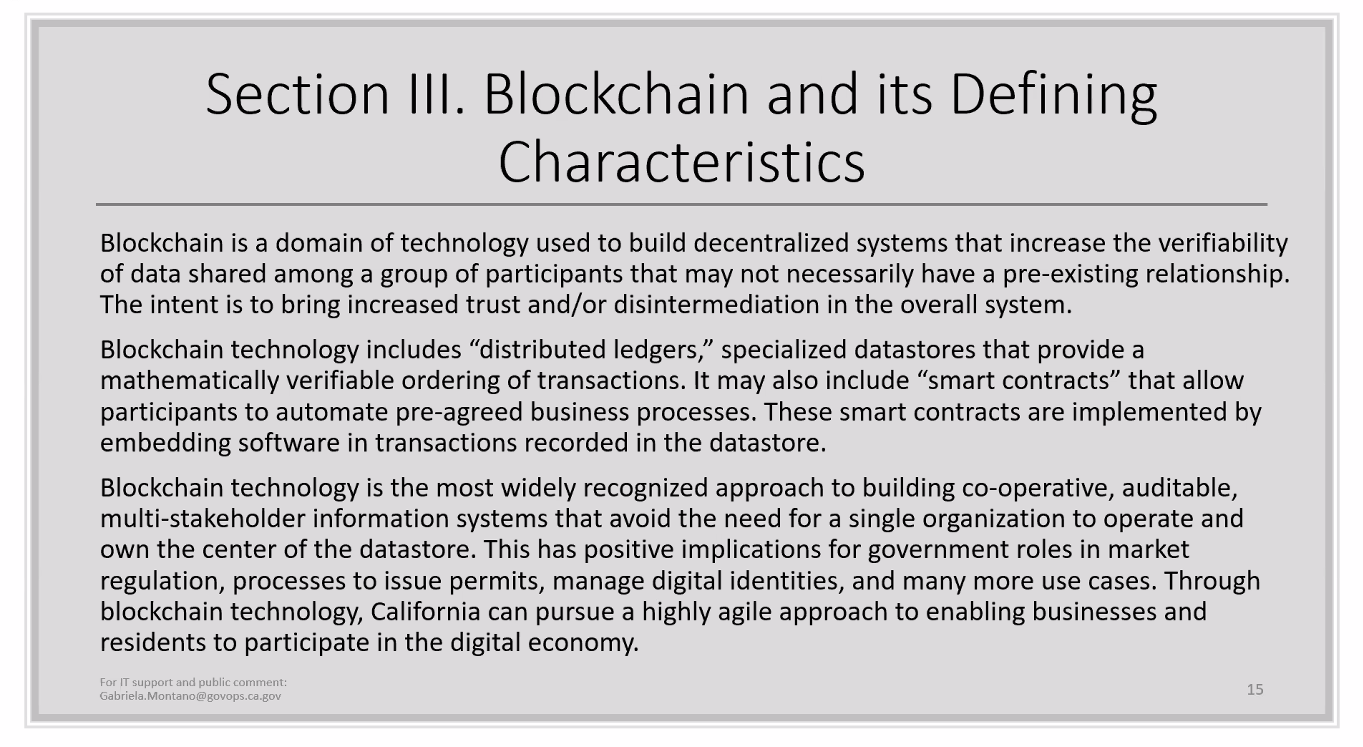The California Blockchain Working Group is having a big push before their July 1st deadline to finish their mandated report. Last Friday, the 22nd of May, the group convened to position itself for finishing all aspects of the report. The one hangup that the group keeps having is about the definition. It’s a bit of a sore subject, but subsided after this last intense debate.
Mostly the contention comes from legislators, who ultimately know other legislators are going to read the long definition and by the third sentence will just glaze over it. The group took months to agree on the current definition. Now a 2 sentence summary is being requested. A compromised agreement stated that a shortened version of the definition would be acceptable as long as an appendix to the longer, more legal definition remained.

Meetings are posted on the Gov Ops Blockchain Working Group website 10 days prior to a meeting. The agenda of each meeting, as well as supporting documents and other resources are published under the meeting date it corresponds to.
There is already another meeting scheduled for June 2nd from 2-5pm.
If you’d like to catch up on how the CA BWG got to this point, I’ve written several blog posts over on CoinStructive summarizing many of the meetings.
The Uniform Law Commission update
Also this week, on both Friday and Saturday, the Uniform Law Commission is meeting to discuss the incorporation of digital assets and blockchain technology into the existing Uniform Commercial Code. Each state chooses how to enforce the UCC, which is why the ULC is creating template law.
The last time the ULC worked on a crypto related topic was back in 2017 when they were finalizing the Virtual Currency Businesses Act. Many states have adopted portions of this proposed legislation as a succinct way to start introducing regulation. States that currently have bills proposed in legislation are Oklahoma, Hawaii, Connecticut and California.
What works for some, doesn’t work for all. Therefore, it’s up to the individual states to determine what is right for them. The benefits of having uniformity across states makes it easier for consumers and companies to operate confidently.
I believe this is the third meeting of the ULC to discuss the Uniform Commercial Code and Emerging Technologies. Here’s a synopsis of the group.
The Joint Study Committee on the Uniform Commercial Code and Emerging Technologies, with members from the American Law Institute and the Uniform Law Commission, will review the Official Text of the Uniform Commercial Code with a view to recommending or possibly drafting amendments or revisions to the Uniform Commercial Code to accommodate emerged and emerging technological developments. The committee will consider, among other technologies, distributed ledger technology and virtual currency and other digital assets.
The Uniform Commercial Code is fascinating because it covers so many financial products, and needs an update badly. The last update ocurred during the introduction of ACH. The UCC has rules how banks process incoming company payments, but organizations like PayPal aren’t subject to those same laws. Ultimately either the customer or the consumer loses protections when using a system like Venmo for convenience.
The UCC is complex, so rather than dig in here, I suggest joining the meeting as an Observer. If you can’t get in touch with anyone, reach out to me and I will do what I can. This week might be a little short notice.
Stay up to Date
*** If you like this information, would like to know when more becomes available or want to stay informed about upcoming events and how to participate, please sign up for our Blockchain and Cryptocurrency Legislation focused newsletter.

